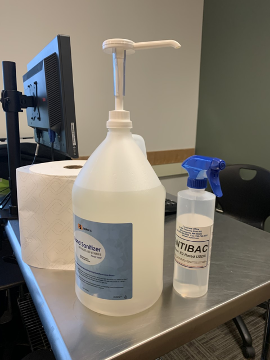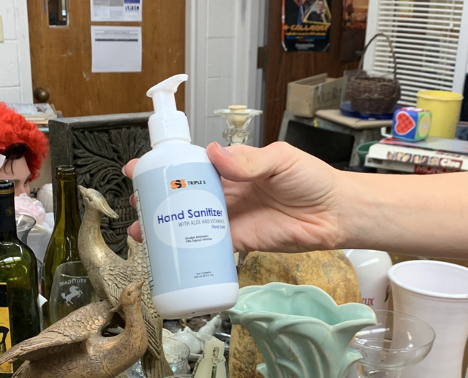
By Julianne Thornton, contributing writer
Feature photo by McKendree, photos by Julianne Thornton
As we all know, many universities cannot hold in-person classes or are holding hybrid courses. As a student who attended a community college and is now attending a private university, I set out to explore the opinions of a few of my former and current professors to understand if the two different schools are experiencing similar feelings about COVID-19 and the precautions that are in place to stop the spread.
I paid a visit to Southwestern Illinois College (SWIC) to cover a few details related to my degree. And WOW. Yes, social distancing is taking place. Yes, the teachers are doing everything in their power to combat this virus. Yes, some courses are being held differently than they usually would be. However, it seems that McKendree has sanitation supplies more readily available. I felt as though I had to go searching for a bottle of hand sanitizer at SWIC, whereas at McKendree there is a gallon of hand sanitizer around every corner. The bottles of sanitizer at SWIC are significantly smaller than those I observed in classrooms at McKendree.
I reached out to a few teachers from both SWIC and McKendree to gain some perspective on their thoughts about how their own schools are handling this pandemic.
The first question I posed was whether or not teachers feel safe when teaching in-person classes. A popular opinion among professors expressed that, yes, they feel safe in the classroom. This question was unanimous among the four professors–two from each school–that I was able to speak to or question on the topic. Julie Covlin, Adjunct Professor of Communications at SWIC, did express that she would feel safer teaching from home, but her responsibility to her students and the precautions that have been put in place ease her mind.
While holding in-person classes is nice for those of us who benefit more from being in a classroom setting, do teachers feel that online courses are just as beneficial? Paula Haniszewski, the Art Department head at SWIC, feels very strongly about this question, answering with a solid NO.
“Student’s aren’t always able to have the proper space or materials required for classes such as oil painting,” Haniszewski said, “I am just not able to teach them as well or give them the same learning experience if they aren’t working around me.”
Each of the teachers I inquired with all had a relatively similar response. Yes, online learning can be beneficial, but they feel as though being in-person is more beneficial. Rich Murphy, McKendree professor of public relations, explained that he feels that teaching online is not his strong suit.
“I do much better in class, where I can read nonverbal feedback, make adjustments in class, and get better interaction,” Murphy said.
The four teachers I spoke to all agreed that there are proper precautions in place. Most also agreed that they felt adequately supplied with the proper cleaning and sanitation supplies necessary to keep a clean classroom. Professor Haniszewski feels that although the classrooms at SWIC are provided with hand sanitizer and spray, their facility “is not a hospital.” She believes that while sanitation supplies are being provided, there is only so much power within the school to prevent the spread of COVID-19.
How do teachers see the students reacting? Are they following along with recommended guidelines? The McKendree and SWIC teachers I spoke with seem to be observing similar behaviors among students. They see students pull their masks down occasionally. When asked to correct their actions, there has been no pushback or argument. The other popular observance was that although students are wearing masks, they are not always sanitizing their desks. There are sprays provided in both schools’ classrooms for the purpose of sanitizing surfaces, and the professors all expressed that they would like to see students become more proactive in cleaning their work areas.
COVID-19 has created many challenges that no one expected. These challenges are especially prevalent in learning environments such as colleges and universities. Challenges must be overcome in educational journeys, whether it is the teacher, student, or both facing these challenges. Difficult roads often lead to beautiful destinations, and COVID-19 is definitely bringing along new obstacles in everyone’s educational path.
“To be clear, wearing a mask and using video conferencing technology are absolutely essential, but they create new challenges,” McKendree University professor Joe Blasdell said.
While students and teachers alike find ways to overcome the challenges of COVID-19, no matter where they are, it is important to remain positive. This someday may be a learning experience that will be more than memorable, for anyone embarking on an educational journey.


Julianne, thanks for sharing this article. This is a challenging time for faculty and students, but thanks to all who are doing their part to keep our community healthy.
This was very interesting to read ! I enjoyed reading about the comparison of the two institutions and seeing the differences between each school even though they’re relatively close.